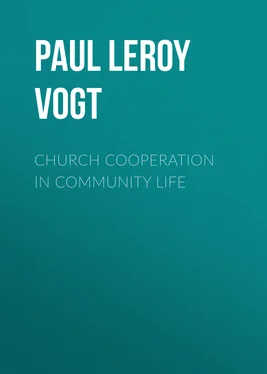Paul Vogt - Church Cooperation in Community Life
Здесь есть возможность читать онлайн «Paul Vogt - Church Cooperation in Community Life» — ознакомительный отрывок электронной книги совершенно бесплатно, а после прочтения отрывка купить полную версию. В некоторых случаях можно слушать аудио, скачать через торрент в формате fb2 и присутствует краткое содержание. Жанр: foreign_prose, foreign_religion, foreign_antique, на английском языке. Описание произведения, (предисловие) а так же отзывы посетителей доступны на портале библиотеки ЛибКат.
- Название:Church Cooperation in Community Life
- Автор:
- Жанр:
- Год:неизвестен
- ISBN:нет данных
- Рейтинг книги:4 / 5. Голосов: 1
-
Избранное:Добавить в избранное
- Отзывы:
-
Ваша оценка:
- 80
- 1
- 2
- 3
- 4
- 5
Church Cooperation in Community Life: краткое содержание, описание и аннотация
Предлагаем к чтению аннотацию, описание, краткое содержание или предисловие (зависит от того, что написал сам автор книги «Church Cooperation in Community Life»). Если вы не нашли необходимую информацию о книге — напишите в комментариях, мы постараемся отыскать её.
Church Cooperation in Community Life — читать онлайн ознакомительный отрывок
Ниже представлен текст книги, разбитый по страницам. Система сохранения места последней прочитанной страницы, позволяет с удобством читать онлайн бесплатно книгу «Church Cooperation in Community Life», без необходимости каждый раз заново искать на чём Вы остановились. Поставьте закладку, и сможете в любой момент перейти на страницу, на которой закончили чтение.
Интервал:
Закладка:
One or two illustrations should make this point clearer. Several years ago it was the custom to use common drinking cups on railways. When first legislation was passed to prevent such use, considerable public opinion opposed it as foolish. Now, it is difficult to get any one to touch a common drinking cup even in the home. Before the elimination of the saloon powerful and sometimes very respectable forces were lined up in favor of its continuance. But as soon as the fight against the saloon had been carried to the point of its legal elimination many of those who once supported the barroom because of the profit to them became its opponents. Formerly the saloon was a center for the corruption of many if not most of the youth in the community. Now, most communities are bringing up a far higher grade of young people morally than they once were because it is no longer necessary to fight against this center of immoral infection.
The lesson these illustrations should teach is this: that the conventional method used by the churches during the past half century of depending almost entirely upon individual regeneration through personal appeal as a means of salvation of the race has handicapped the church and limited its effectiveness. When it is once understood that the mind and the character of the individual can be influenced in as many ways as there are social contacts, and when the means of approach through all these contacts is understood, then the effectiveness of the church will be immeasurably increased. Social life must be saved not only through individual regeneration but also through the establishment of a right attitude on the part of the individual and as many individuals as possible. On the other hand, individual attitudes can be established in large part by bringing about, through means now fairly well understood, good economic conditions and social organization.
The sad part about the traditional limited method of approach to improvement of group life has been that in probably the majority of cases impulses were aroused by personal appeal to do good and then through ignorance of objectives in group advance those impulses were allowed to die. The "backslider" is an excellent illustration of the results of periodic renewal of impulse to right living. In most other cases the impulses thus aroused have found their expression in a hypersensitiveness in regard to certain phases of personal conduct. Emphasis upon personal moral conduct to the exclusion of effective interest in social progress characterized much of the product of the personal evangelistic campaigns carried on periodically during the past two or three generations, while the real work of making the world better has been directed by men and women not particularly subject to these periodical waves of religious impulses but imbued with a steady abiding faith in the worth of social action. They have had the good impulses, but these impulses have been steadied and rendered permanently valuable because faith based on knowledge of objectives was available.
If the serious errors of the past are to be avoided it will be necessary for those intrusted with responsibilities of church leadership to vastly increase their knowledge of problems of group life and of methods of control of group life. The following pages are designed to aid the prospective religious leader, either professional or lay, as far as possible in understanding some of the problems that must be dealt with in making human life what Christianity hopes for. Results already have been achieved sufficient to place beyond question the principle that the church must approach life from every possible angle. The effort to produce right attitudes in the individual must be continued, but the methods used must be varied and multiplied.
Furthermore, before the sound point of view with reference to the method of approach to the problems of the church can be obtained it will be necessary to have a clear understanding as to the place of the child in the moral order. Those who derive their theology by reading and interpreting isolated passages of the Scriptures sometimes arrive at unexpected, and, from the point of view of rational living, eccentric and positively harmful conclusions. Some devoted readers find in the writings of Paul something about "Whereas in Adam all die, in Christ all are made alive"; and in Christ's words the utterance to Nicodemus, "Except a man be born again he shall not enter the kingdom of heaven." They have drawn from these doctrines that all men are born with sin inherent in their natures and that there is no good in the soul until "conversion" has taken place. So long as these doctrines find a place in the preaching and practice of churches the method of world salvation will be radically different from that for which the writer is contending.
In brief, if the words of Christ are taken at their face value when he said "Suffer little children to come unto me, for of such is the kingdom of heaven," we have an entirely different basis of approach to our problem than if we assume that all are lost except those upon whom the mystical influence of "conversion" in the traditional sense has operated. If the assumption that children are born good is accepted, then we are brought to the question, "How may these innocents be kept so?" The answer is, By training them to control their natural impulses, good in themselves but likely to lead into wrong if not properly directed; and by cultivating the natural tendencies to good that find expression in every normal child. They must also be brought to an understanding of what Christ means to them as their Saviour and Guide. Then this must be supplemented as rapidly as possible by the organization of group life, in such a way that evil influences will be eliminated.
The saloon was not many years ago the center of corruption of thousands—yes, millions—of the growing youth of this country. The elimination of the saloon has made possible the development of millions of young people free from the particular type of sinfulness for which the saloon was responsible. In like manner, the elimination of commercialized vice has rendered our cities incomparably safer for our young men and women than they once were. The substitution of wholesome amusement for young folks in good environment for the unregulated commercialized amusements once the sole source of recreation has exerted a moral influence too far-reaching to be estimated. The introduction of cooperation in industry has eliminated the sin accompanying the fights between capital and labor in those industries where it has been introduced. These illustrations show how it is possible, by continuing the improvement of social and economic conditions to create such an environment as will destroy the sources of individual corruption and degeneration and will make the growth of the child a continuous succession of stages of spiritual improvement and growth. "Conversion" can thus conceivably become a conscious personal acceptance of Christ and of the principles of Christianity as the normal basis for right living without a noticeable break in the course or direction of life rather than the intense emotional cataclysm that so often characterized the change in hardened sinners.
When children good by nature are brought up in an environment physical and spiritual that has been brought into harmony with the laws of God, then the problems of evil will be reduced to those arising out of natural causes over which man has not achieved control; and children will be looked upon as the natural and rightful members of the church instead of being kept out of the church until they reach the age of accountability. The burden of getting out of the church should be put on the child instead of the usual responsibility of deciding to come into it.
It is customary for leaders of the church to assume credit for practically all the good things going on in the direction of human improvement by assuming that, though the church does not have a large membership, comparatively speaking, its influence has inspired the good work being done in social progress. It is well to face frankly the fact that, whatever may have been the situation in the past, at the present it is questionable whether the church has been the source of even the larger portion of this inspiration. The public schools, including the higher institutions of learning, have been socializing the future leaders in social progress so that their inspiration has been drawn from a concrete knowledge of social problems and from the belief that humanity can, by proper effort, control conditions of living. Then pragmatic results have furthered this belief until inspiration has come from the achievement of results themselves rather than from any recognition of Christian influence in social life. The Christian religion is doubtless responsible for those things most worth while in modern life, but other sources of inspiration have developed for which Christianity does not get the credit.
Читать дальшеИнтервал:
Закладка:
Похожие книги на «Church Cooperation in Community Life»
Представляем Вашему вниманию похожие книги на «Church Cooperation in Community Life» списком для выбора. Мы отобрали схожую по названию и смыслу литературу в надежде предоставить читателям больше вариантов отыскать новые, интересные, ещё непрочитанные произведения.
Обсуждение, отзывы о книге «Church Cooperation in Community Life» и просто собственные мнения читателей. Оставьте ваши комментарии, напишите, что Вы думаете о произведении, его смысле или главных героях. Укажите что конкретно понравилось, а что нет, и почему Вы так считаете.












